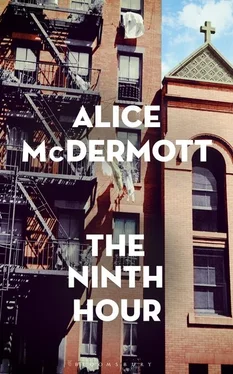The windowsill of the train was now as sooty as any subway’s.
The smell of soot, in fact, was lofting through the car. She put her forehead to the glass to see if there was a refinery outside, a house fire, a blazing garbage dump. Fire and brimstone. It seemed the right smell for this hellish train, this terrible journey that could not have taken her farther from the convent’s clean laundry and the pretty joy she had felt just this afternoon about the consecrated life she was called to.
There was only darkness beyond the train window, her own vague reflection passing over it. She wondered how many miles they had gone and, with the thought, felt the flood of tears she had not realized she’d been keeping at bay, had been keeping at bay since she last glimpsed Sister Jeanne and her mother through this very glass. She put her fingertips to the window. Her mother and Sister Jeanne had once stood framed within it. The tears came, bitter and unrelenting. Life a bleak prospect to a motherless child.
At her back, she heard the dirty woman say, “Serves you right.”
It was three in the morning.
By the time the train came into the station in Chicago, she had done her calculations: she had the money in her wallet, and the remaining bills pinned to the lining of her handbag. She also had a dollar in each shoe—following the Tierney twins’ advice. She would get herself a sleeping car for the journey home.
There was the scent of morning air inside the beautiful station—the familiar scent of early-morning city air that made her feel for just a moment that she had not arrived but returned. There was something lovely in the bright beams that poured in from the skylights, touching down here and there on the wide floor.
There was the bustle of many busy people, the trailing presence of the dirty woman, whose breath she could still taste. She saw the two nuns who were there to meet her, their clean and simple forms, arms folded, idle hands tucked into their sleeves. One was young, one older. They both smiled as she approached. Their skin, after the heavy powder of the woman on the train, looked pure, newly formed, despite the peach fuzz and wrinkles on one and the scattering of blemishes on the other. She recognized the smell of sunlight and starch on their habits. She recognized the offer of friendship in the younger one’s shy brown eyes.
She would love the companionship of nuns for the rest of her life.
“Here you are,” the old one said, holding out her immaculate hands, welcoming her. “We’re so happy you’ve thought to join us.”
Sally put her suitcase down. She might have seen the Bronx girl walking quickly past from the corner of her eye. “The truth is,” she said, “I’ve thought better of it.”
THERE WERE NO NURSING SISTERS on the street when she walked up from the subway. No Patrick Tierney, either, to call out, “What did I tell you?” when he saw her lugging herself home. That was lucky. She had slept only briefly on the train coming back—buttoned into a lower bunk, but no less terrified going east than she had been going west. The torment on the trip out had been those awful people. The torment of the trip home was the utter loneliness of that dark, narrow berth.
The movement of the train was with her still, in her back and under her feet, as she walked down her own block with her suitcase and then up the familiar steps. There was no one in the entry. No Mrs. Gertler perched in her window on the parlor floor. That was lucky, too. She climbed the stairs. It was early afternoon, but her lack of sleep, her unplanned return, made the hour of the day seem uncertain and strange. Just forty-eight hours ago, she had said her goodbyes to this place, folded into her view of herself the romantic notion that many years would pass before she saw it again. It would not take much imagination, tired as she was, to believe that time had, indeed, intervened and she was returning like some Odysseus, much older and much changed.
Life goes by in the blink of an eye. It would not take any imagination to convince herself that it already had.
Her mother’s voice reached her through the open transom above the apartment door. Her mother’s laughter. Distinct and familiar and yet, as well, indistinguishable from the man’s voice that ran just beneath it. A man’s voice low but rising, rising and falling in a kind of enumerating rhythm, the rhythm of a tale being told, a joke or a story. Inside the apartment, a man was telling her mother a story and her mother was laughing, laughing here and there. There was always something enviable about her mother’s laugh. Ever since she was a child, Sally flew to it. Put up her arms, put her hands to her mother’s broad cheeks to say, What? What?
She thought of Sister Jeanne, raising her face to the sound of it, as if to a warm sun.
Sally eased open the door. Placed her suitcase beside the couch. From the living room she could see that the man had drawn a dining chair into the kitchen doorway. He was sitting in it crookedly, his back to her. He was in shirtsleeves and had his hands in his pant pockets. Her mother was in the kitchen just beyond him, at the stove, but in easy reach. She was frying something in a pan—the spit and sizzle of ham. She was laughing. He was talking. Never in Sally’s experience had a man in shirtsleeves sat in the kitchen doorway in this way, talking to her mother in this way. Not as a visitor would, but as one who was utterly at home in, utterly familiar with, these few rooms. She moved closer, through the living room, to the long sideboard.
From where she paused she could see him better. His hair was black and touched with gray, thick over his neck but thin at the top. His shoulders in his striped shirt were wide. He was collarless. In the glass of the kitchen’s single window she could see a vague reflection of his face: broad forehead, pale, and dark eyes made shadowy by the reflection. “‘Are you telling me?’” he was saying, and Sally recognized the brogue. “‘Are you telling me,’ I asked him, ‘that after all this time…’”
“After all that time,” her mother said without turning, laughing with him, her hips moving, the hem of her long skirt moving, moving with her laughter, and her voice—what was it about her voice that was so new?—bright, easy, warm. Both of their voices so familiar in the exchange. When had she ever heard such a thing in these rooms? When had she ever seen such a thing?
Telling us later, she said, “I had to rub my eyes.”
And then she saw, with an intake of breath, a cry of surprise, that the man’s thin white feet were bare on the linoleum floor.
“Glory be to God,” her mother said, and the man, turning, sat up in his chair. Not Jim at all, not her father returned to them, to her, returned to life in the interval of her departure, but Mr. Costello, the milkman, struggling to stand now, politely, long bare feet and all.
In the bedroom, the sheets and the coverlet were folded down. There was the smell of cigarette smoke in the air, the smell of flesh, some paler, warmer version of the human air of the train. The man’s worn jacket was draped over a chair. His empty shoes placed side by side at the foot of the bed. Her mother followed her there and closed the door behind her.
“You’re back,” she said. Her hair was loose. Her cheeks flushed red. She had grown younger in Sally’s short time away. “What’s happened? You frightened the life out of me.” She paused, and together, mother and daughter took in the tumbled room, the counterpane, the white coat, the man’s two empty shoes at the foot of the bed.
“You’re back,” her mother said again, but this time as if she understood it plainly.
Sally took in the room, what had been her room, her own bed.
Читать дальше










